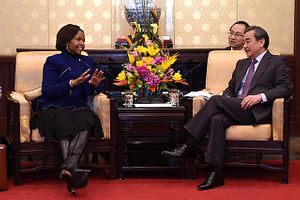China stands among a tiny handful of nations laying claim both to ancient civilization and present great power status. Despite these achievements, its driving national narrative is that it suffered a “century of humiliation” at the hands of the great powers of the 19th and early 20th century, referring to a string of lost wars, unequal treaties, foreign concessions, and forced opium trade that humbled a once-great power. Now as a newly revitalized China whets its appetite for the developing world’s resources, some are beginning to see it acting like the very colonial powers it blames for its “humiliation,” specifically in two ways: (1) the mass importation of Chinese workers, and (2) insisting on an extractive style of commerce.
As a measure of the extent of Chinese presence in developing nations, consider that during the 2011 crisis in Libya China evacuated 35,000 ethnic Chinese. Some assert that as many as a million Chinese workers have migrated to work in Africa, although others dispute the precise figure. There is a palpable fear of China’s great population overwhelming and replacing that of less populous nations. On the other hand, compared with Africa’s combined population of 1.2 billion, the presence of even a million middle-skill Chinese expatriates would not seem to be a particularly dramatic influx. Such a presence is far better explained by market forces than colonization.
While the migration scare may be more fear than fact, China’s dubious business practices are seriously damaging its reputation. In Ghana, for example, Chinese mining interests pay citizens for the use of their right to extract gold. The companies then abuse those rights, exceeding legal mining limits and inflicting extensive environmental damage while leaving Ghana and Ghanaians with little to show for it.
There are grave questions about host nations’ political will to resist such Chinese exploitation, shown most clearly by Sri Lanka’s cession of the port of Hambantota to China. Using debt owed by Sri Lankan leaders for leverage, China has acquired a strategic port for future operations. Ironically, China and Sri Lanka are terming the port deal a “concession,” an arrangement perilously similar to the one China fought against to during its “humiliation.”
Most hypocritically of all, China appears to have become a leading exporter of harmful drugs to the world (for example here, here and here), thus assuming the drug-dealing role it once despised. And this points to a basic problem of Chinese international development: it is unmatched in the innovation of corruption, willing to take any action the market will bear that produces a profit. But the world is becoming wise to such deceit and will not tolerate it forever. And I do not believe China will tolerate it either.
There is a strong moral force among the Chinese people that will push their government toward some form of sustainable development. The nation that once allowed the people of Wukan a direct say in their own governance and deplored the callous death of Wang Yue will have to find a way to give something back to its partners, not just strongarm them. The Belt and Road cannot be a trail of scorched earth and broken promises. To be sure this path will be China’s own, subject to Party discipline and not a copy of Western models. But as the world’s people demand accountability from China and expose its insidious practices – as with the new U.S. National Defense Strategy – I suspect China will also demand it of itself.
The views expressed in this paper represent the personal views of the author and are not necessarily the views of the Department of Defense or the Department of the Air Force.

































